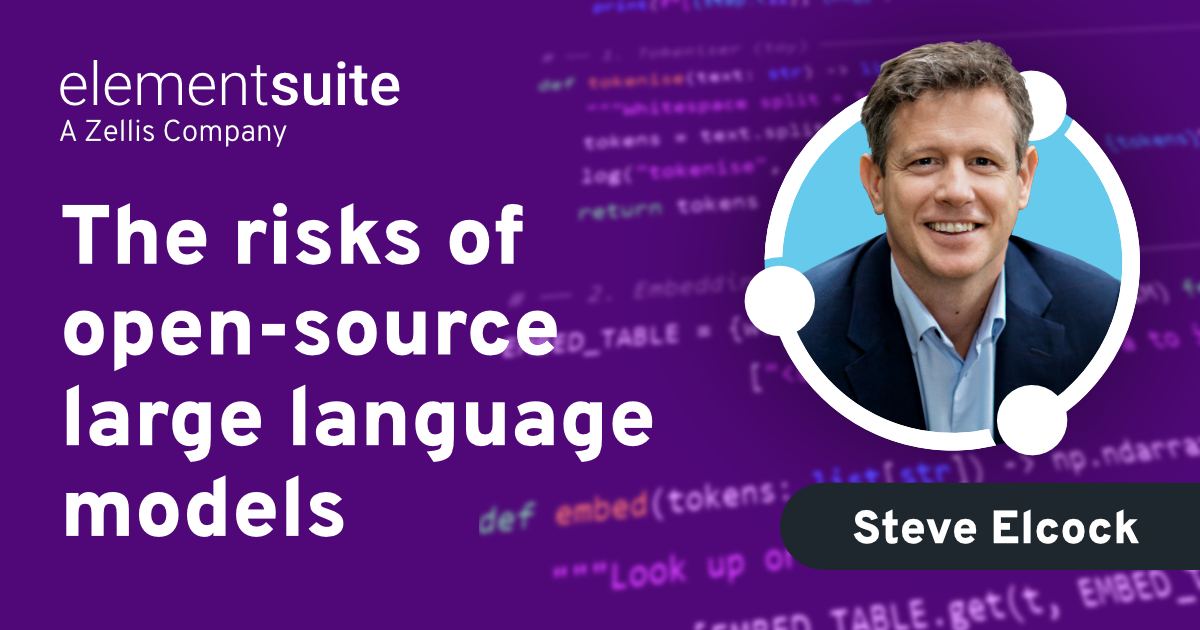In today’s fast-paced workplaces like retail, hospitality, manufacturing, and more, real-time feedback is essential to creating a responsive and engaged workforce. But here’s the catch – most HR teams and managers simply don’t have the time to provide constant feedback, and this often leads to employees feeling in the dark about their progress, especially in organisations that have hourly workers, where it can be tricky to find time. Adding to the challenge, HR teams and employees are often based in different locations, making it even harder to maintain consistent communication.
That’s where AI comes into play. By leveraging AI-powered tools, you can streamline feedback delivery, giving your team the timely, constructive feedback without adding to your already full plate. In fact, 59% of UK people managers are already using AI specifically for performance reviews and feedback.
Let’s look at five ways you can use AI to create a feedback-rich culture that enhances the employee experience and drives business outcomes.
1. Instant performance review status
Have you ever been caught off guard because a team member asked about their performance review, and you didn’t have the details at your fingertips? With AI, that scramble becomes a thing of the past. By tapping into real-time status updates, AI enables managers to track feedback and performance reviews instantly, eliminating those frustrating delays and keeping everyone on the same page. For example, imagine a restaurant manager needing a quick summary of an employee’s ad-hoc performance reviews to see if there’s any general feedback on table side interactions. Rather than manually searching through multiple documents or systems, you simply ask: How many ad-hoc performance reviews has Stacey had this year?
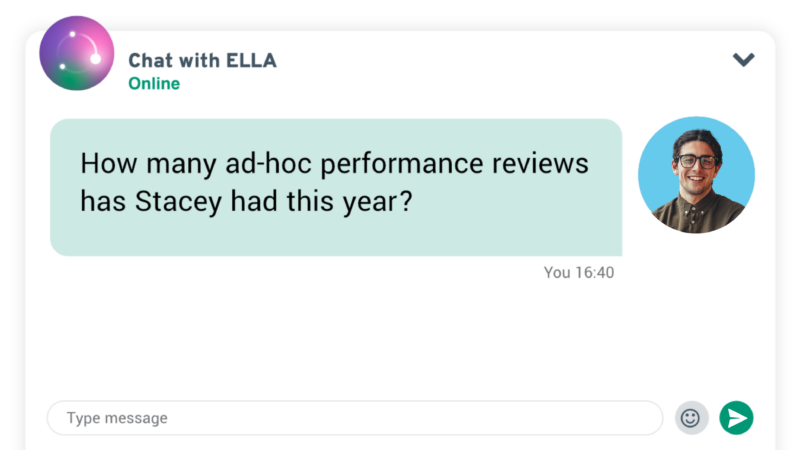
With the right AI tools, this information is available in seconds, improving response times and helping you maintain an organised approach to performance tracking. This real-time status check doesn’t just help HR; it also empowers managers to take a more active role in employee development, as they can provide instant feedback and address any emerging issues quickly.
Real-time status updates and instant feedback access make it easier to manage performance reviews efficiently, reduce delays, and help employees feel valued and seen. It’s a win-win for your whole team!
2. Automated review progress tracking
Tracking performance reviews can feel like a never-ending task, especially when multiple teams and departments are involved. Take a manufacturing organisation, for instance, tracking performance reviews whilst managing multiple shifts across production teams can be tricky. Reviews can get stuck in various stages, creating bottlenecks that slow down the entire process. This is where AI’s continuous monitoring capability comes into play. AI can keep an eye on review progress and alert you if certain reviews are lingering in one stage for too long. For example, you might ask an AI tool: On average, how long are performance reviews under the status ‘with reviewer’ at Site Y?
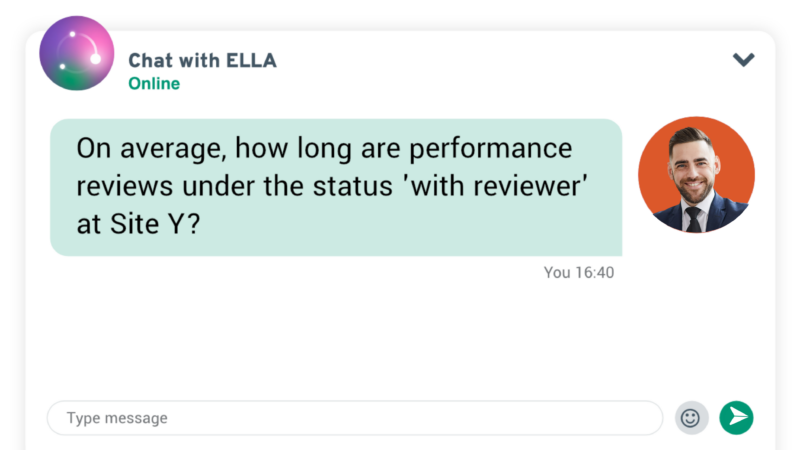
By monitoring each step, AI helps you maintain momentum and ensures feedback doesn’t get lost in the system. It also allows HR teams to identify areas for improvement in the feedback flow. This makes it easier to build a consistent feedback process that employees can rely on, rather than one that only moves forward when someone has the time to manage it.
The automated tracking keeps the feedback process moving, identifies bottlenecks, and saves valuable time. AI’s ability to monitor progress continuously ensures that no review goes unnoticed, ultimately helping you maintain a more efficient feedback flow. This can make a big difference to employee satisfaction in fast-paced industries, where, between rush hours and seasonal demand, finding one-to-one time is not the easiest.
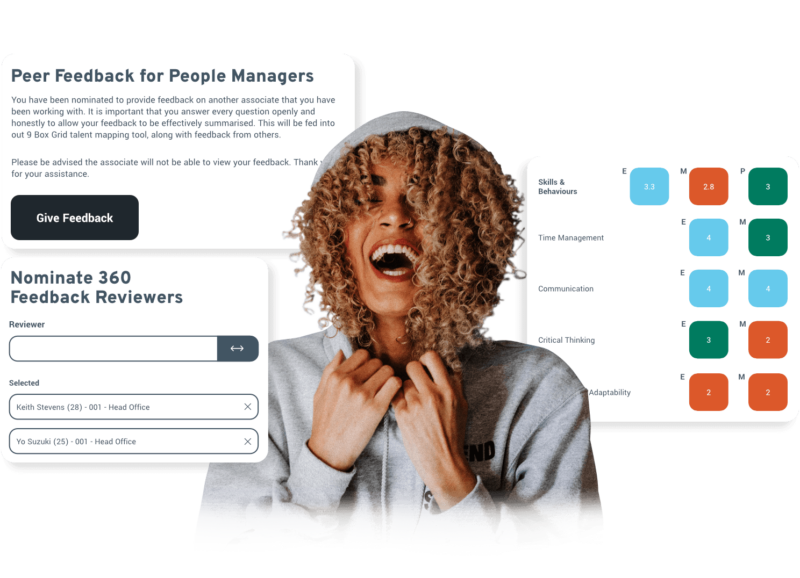
3. AI-driven career development insights
When employees can see a clear path for growth within your organisation, they’re more likely to feel motivated and engaged. For example, a sales associate in a retail organisation might start out as a part-time employee, but the ability to have transparent performance tracking and clear milestones would allow them to see the opportunities to progress to a full-time supervisor or store manager role, which can help employee retention. Career development feedback isn’t just a nice-to-have; it’s a crucial part of an employee’s journey. AI can support this journey by providing instant, personalised career guidance based on performance data, skills, and available training opportunities. You can give prompts like: Give me an ideal career path for a Store Manager at the Cardiff site.
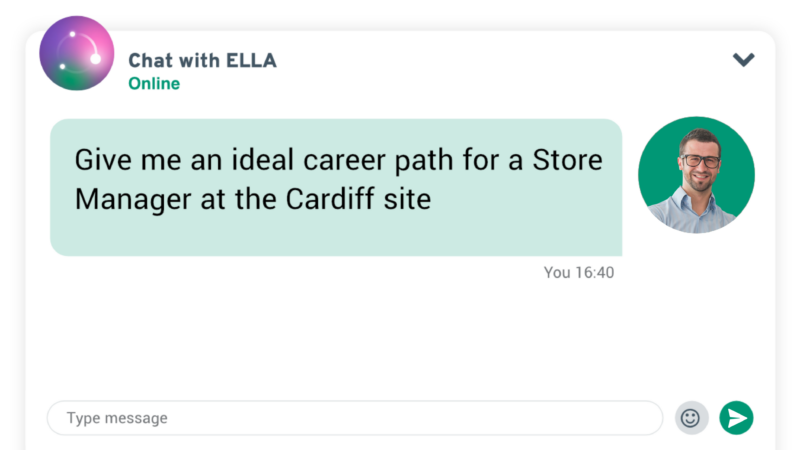
In seconds, AI can suggest potential career paths, outline the skills needed, and even recommend development programs or training.
With instant insights into career development, you’re able to guide employees on their growth trajectory and build a culture that values continuous learning. AI makes career discussions less about speculation and more about real, data-driven suggestions that empower employees to take charge of their development.
This personal touch shows them that you’re invested in their long-term success, which boosts morale and retention.
4. Proactive review management
Performance review cycles can easily get lost in the shuffle of day-to-day responsibilities, particularly in industries with frontline workers. With AI, you don’t have to worry about overlooking a review or letting deadlines slip by. AI can proactively track review cycles and notify managers when it’s time to take action. This feature means you can stay ahead, ensuring all reviews are completed on schedule and eliminating the need for last-minute scrambles.
Take, for instance, the prompt, how many employees have an active performance review at the Newcastle site?
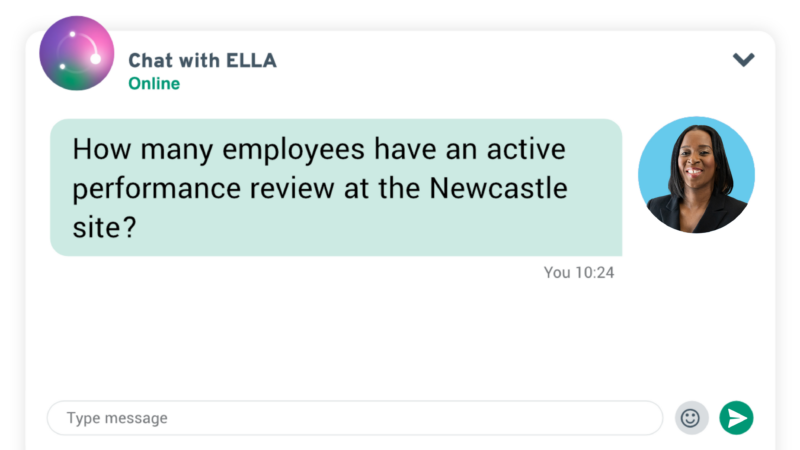
Not only does AI track these reviews, but it also helps with communication automation, crafting reminders and even setting up notifications to keep everyone on track. It’s like having a digital assistant for review management, helping you stay organised and responsive.
5. On-demand feedback access
Traditional feedback models often leave employees waiting until the next review cycle to get any real insights. But today’s young and digital workforce wants – and expects – real-time information, especially when it comes to their performance. AI can make feedback available on demand, empowering employees to access their review status and feedback without needing to wait for a meeting or reach out to HR. For instance, imagine a cleaner in a hotel has multiple shifts in one day, they likely don’t have time for catch ups. But in between shifts, they can easily ask “When is my next performance review?” With AI, they get an immediate answer, saving time and encouraging a more proactive approach to their career.
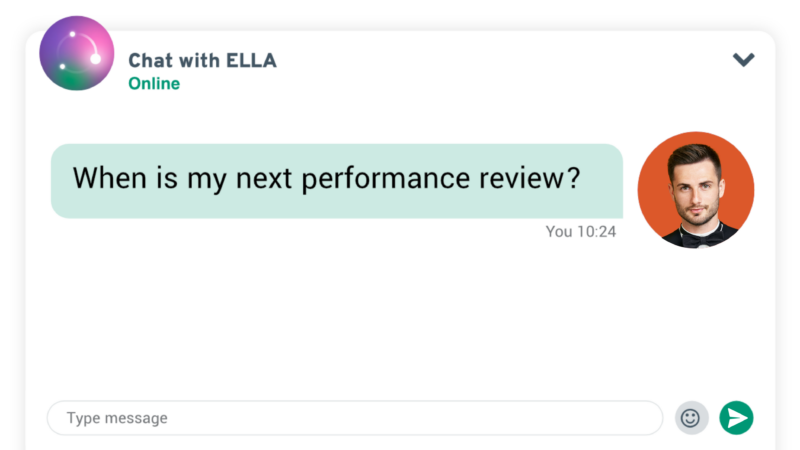
This instant access to feedback isn’t just convenient; it’s also a powerful way to encourage self-improvement and foster employee empowerment. When employees have access to real-time information, they feel more in control of their own development and are more likely to take initiative in areas where they want to improve.
On-demand access to feedback gives employees the autonomy to track their progress and take ownership of their growth, resulting in a more engaged and proactive workforce.
Constructive feedback: Combining the human element with AI
While AI is transforming feedback delivery, constructive feedback is still something that benefits from the human touch. Feedback should ideally be a balance between automation and personalisation. AI’s role in the feedback process is to handle the routine tasks, track performance data, and highlight areas of improvement, so managers can focus on meaningful interactions with employees.
When constructive feedback is timely and backed by AI’s objective insights, employees are more likely to engage and respond positively. Think of AI as an enhancement tool, supporting you with data-driven insights so you can concentrate on fostering effective communication and building stronger connections with your team.
Combining AI technology with human communication creates a balanced feedback approach, building employee engagement while ensuring feedback remains personalised and effective.
By using AI in these ways, feedback becomes less about checking off a task and more about fostering a continuous culture of growth. With automation in place for real-time feedback, employees feel empowered, valued, and supported in their journey with your company. It’s time to explore these AI capabilities and see how they can transform your feedback process—making it faster, easier, and more impactful than ever.


